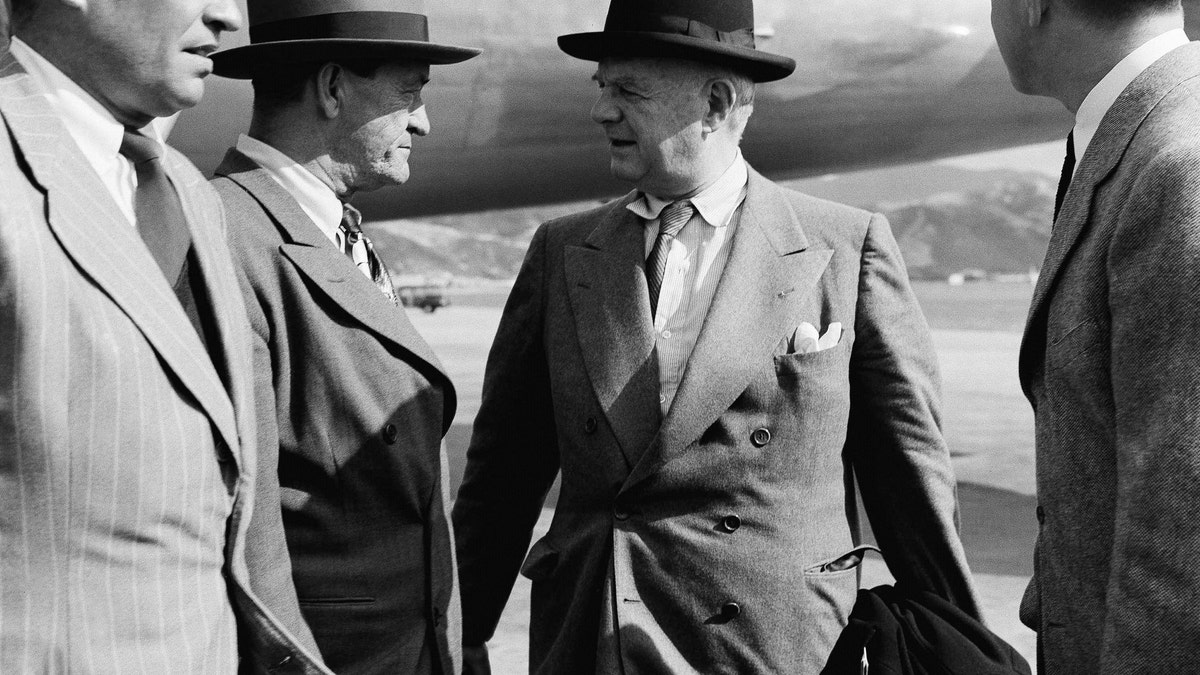
In this Jan. 3, 1950 file photo, Maj. Gen. William (Wild Bill) Donovan, center, the New York attorney who headed the U.S. Office of Strategic Service during World War II, is greeted by Maj. General C. L. Chennault, left, on his arrival in Hong Kong. (AP)
ALBANY, N.Y. – The men and women who spied on Germany and Japan for the U.S. during World War II parachuted behind enemy lines, led guerrilla raids, invented special equipment such as scuba gear and established a counterintelligence network that endured into the Cold War.
Nearly 70 years after its agents played a key role in defeating the Axis powers, the spy organization that later became the Central Intelligence Agency is being proposed to receive the highest civilian honor bestowed by Congress, the Congressional Gold Medal. Legislation introduced last week by Sen. Mark Kirk, R-Ill., and Rep. Robert E. Latta, R-Ohio, would collectively award the medal to the members of the Office of Strategic Services, known as the OSS.
Along with the Presidential Medal of Freedom, it's the highest award the U.S. gives a civilian. Congressional Gold Medals also have been awarded in recent years to other groups of World War veterans, including Native American "code talkers" and the Tuskegee Airmen.
William Pietsch Jr. was personally recruited for the OSS by its leader, Gen. William "Wild Bill" Donovan, a lawyer and World War I hero from Buffalo, N.Y. After graduating from West Point in early 1943, the young Army officer was introduced to the OSS chief by William Casey, Donovan's aide who would later become CIA director.
"He turned to Bill Casey and said, `tell this young man what his job will be,' and that was it. He didn't waste any time on superfluous conversation," said Pietsch, 91, a retired Army colonel from Chevy Case View, Md.
Known for leading from the front, a trait that earned him the Medal of Honor -- and his nickname -- during World War I, Donovan left the administrative duties of running the OSS to others, Pietsch said. That may explain why many OSS operatives, considered the forerunners of today's U.S. special operations troops, never received the recognition they deserved during the second World War, he said.
"Most of us were neglected, but not intentionally," said Pietsch, a New York City native. "It wasn't a spit-and-polish organization, it was a can-do outfit."
The original OSS members, a mix of military and civilian employees, numbered about 13,000. Only a few hundred are still believed to survive, according to Charles Pinck, president of the Falls Church, Va.-based OSS Society, whose membership includes about 150 OSS veterans.
"We just think it's terribly important to recognize their service while they're still here," Pinck told The Associated Press.
Pietsch eventually became a "Jedburgh," the name of the Scottish town where three-man teams of Allied agents trained before being dropped behind German lines after D-Day. Pietsch's team parachuted into Burgundy in central France in August 1944 and fought alongside the French Resistance. At one point, while the Gestapo was "hunting me down like an animal," Pietsch sought sanctuary from an Italian Catholic priest known to be helping Jews evade the Nazis. According to Pietsch, the priest was Angelo Roncalli, who later became Pope John XXIII.
"He saved my life," Pietsch said.
The Gold Medal legislation calls for the OSS medal to be given to the Smithsonian Institution for display and allows the government to produce bronze duplicates of the medal for sale to the public.
The awarding of a Congressional Gold Medal to the OSS would help keep Donovan's memory alive in his hometown, said Rep. Brian Higgins, a Democrat whose district includes Wild Bill's old South Buffalo neighborhood. A former state office building being renovated into a hotel no longer bears Donovan's name, and Buffalo's new federal court house is named after western New Yorker and former U.S. Supreme Court Justice Robert H. Jackson. The OSS Society was among the supporters who pushed for the new court house to be named after Donovan, a former federal attorney in Buffalo.
"The OSS is synonymous with Gen. William Donovan," said Higgins, a co-sponsor of the measure, which he says has a "good chance" of being passed by Congress. "There's not another individual who's associated so profoundly with the OSS."




